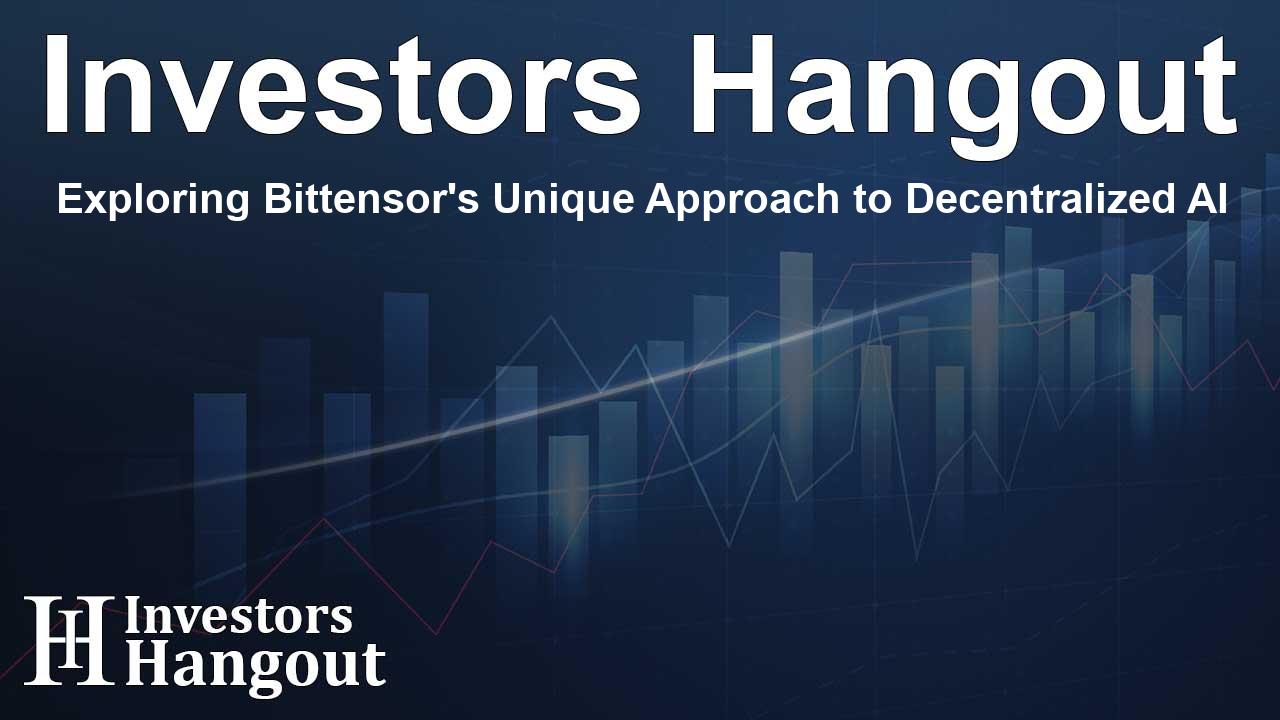Exploring Bittensor's Unique Approach to Decentralized AI

Understanding Bittensor and Its Vision for AI
Bittensor (TAO) has emerged as a groundbreaking endeavor designed to redefine the artificial intelligence (AI) ecosystem. Unlike traditional systems that rely on a few corporate giants, Bittensor introduces a decentralized and open-source neural internet. This revolutionary platform prioritizes collaboration among AI models, providing a space where innovation thrives without the constraints frequently imposed by dominant players.
A Paradigm Shift in AI Development
The conventional AI landscape is dictated by influential companies such as OpenAI and Google. These titans dominate the sector by controlling vast datasets and sophisticated computational resources, creating formidable barriers for smaller innovators who wish to contribute. Bittensor, on the other hand, levels the playing field through its peer-to-peer network. This architecture allows any participant to offer computational power or AI model outputs, fostering a culture where contributions are recognized and rewarded using TAO tokens based on their efficacy and significance.
The Challenges of Centralized AI Systems
Centralized AI platforms have their merits, but they also come with inherent problems. High entry barriers often stifle burgeoning innovators. By monopolizing data and computational resources, these corporations limit the diversity of voices and ideas within the AI community. Bittensor's decentralized approach encourages various unique AI models to flourish, essentially democratizing AI development.
Bittensor's Decentralized Network Principles
What truly sets Bittensor apart is its commitment to collaboration and competition. The network comprises various subnets, each functioning as mini-markets where AI models can compete based on set parameters like accuracy and efficiency. With such a structure in place, participants are not only incentivized to improve their offerings but also to engage with others in a meaningful way.
Incentives for Innovation: The Role of TAO Tokens
TAO tokens play a pivotal role within this ecosystem. They are not merely a medium of exchange; they are intricately woven into the network's governance framework. Token holders actively participate in decision-making, which includes protocol enhancements and resource distribution. This dynamic ensures that the network continually evolves to meet the needs of its participants while promoting a fair rewards system based on individual contributions.
The Future of AI Collaboration
The concept of a ‘Neural Internet’ encapsulates the future envisioned by Bittensor. In this interconnected web, AI entities will no longer operate in isolation. They will collaborate, share insights, and grow collectively. This innovative model leads us toward a future wherein anyone, regardless of their resources, can contribute to and benefit from advancements in AI technology.
Leadership and Governance Structure
Bittensor was co-founded by Jacob Robert Steeves, a former Google engineer, and Ala Shabaana. Together, they established the OpenTensor Foundation to oversee the project. The decentralized governance structure enables TAO token holders to influence the trajectory of Bittensor, empowering them with a voice in critical decisions related to the platform’s development.
Community Engagement and Feedback
Community feedback is invaluable for Bittensor. Through governance proposals along with on-chain voting, participants can propose changes, ensuring that the network aligns with users' needs and perspectives. This transparency fosters trust and cultivates a sense of ownership among users, strengthening community bonds.
Conclusion: A Call to Action for Innovators
Bittensor stands at the forefront of a revolution in AI technology. By decentralizing the control typically held by a few, it encourages widespread participation and innovation. As we advance, it is essential for innovators, developers, and thinkers to engage with this platform, making the most of the opportunities available through Bittensor. With TAO at the center of this evolving landscape, stakeholders can look forward to a future where collective intelligence drives progress.
Frequently Asked Questions
What is Bittensor (TAO) and what does it aim to achieve?
Bittensor is a decentralized network designed to democratize AI development by allowing models to collaborate, compete, and reward contributions through TAO tokens.
How does Bittensor differ from traditional AI models?
Unlike traditional AI systems dominated by corporate giants, Bittensor offers an open platform for all participants, thus fostering innovation and accessibility.
What role do TAO tokens play in Bittensor?
TAO tokens are used for staking, governance, and rewarding contributions, ensuring that participants are incentivized to improve their models and the overall network.
Who are the founders of Bittensor?
Jacob Robert Steeves and Ala Shabaana co-founded Bittensor, operating under the OpenTensor Foundation.
How does decentralized governance work in Bittensor?
TAO token holders can vote on protocol upgrades and resource allocation, giving them a direct say in the network's future development and operation.
About The Author
Contact Owen Jenkins privately here. Or send an email with ATTN: Owen Jenkins as the subject to contact@investorshangout.com.
About Investors Hangout
Investors Hangout is a leading online stock forum for financial discussion and learning, offering a wide range of free tools and resources. It draws in traders of all levels, who exchange market knowledge, investigate trading tactics, and keep an eye on industry developments in real time. Featuring financial articles, stock message boards, quotes, charts, company profiles, and live news updates. Through cooperative learning and a wealth of informational resources, it helps users from novices creating their first portfolios to experts honing their techniques. Join Investors Hangout today: https://investorshangout.com/
The content of this article is based on factual, publicly available information and does not represent legal, financial, or investment advice. Investors Hangout does not offer financial advice, and the author is not a licensed financial advisor. Consult a qualified advisor before making any financial or investment decisions based on this article. This article should not be considered advice to purchase, sell, or hold any securities or other investments. If any of the material provided here is inaccurate, please contact us for corrections.
